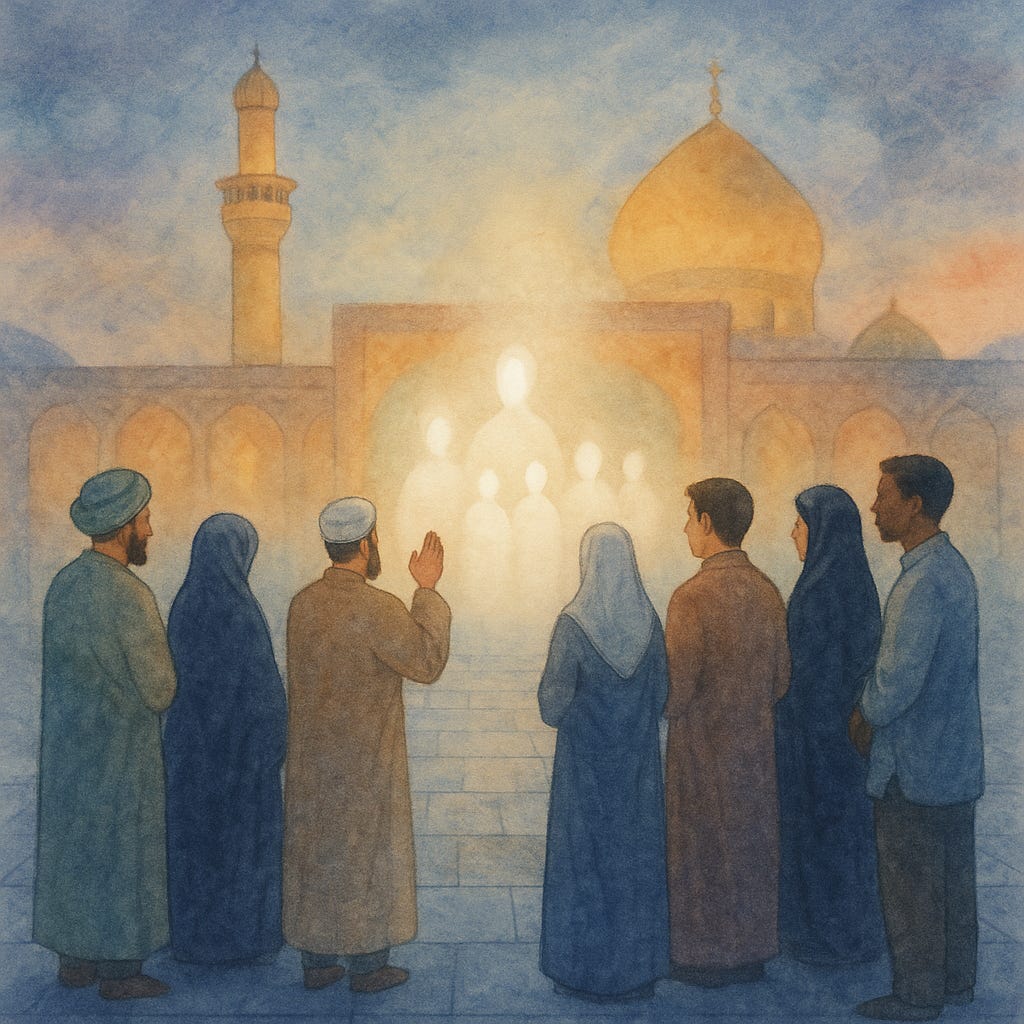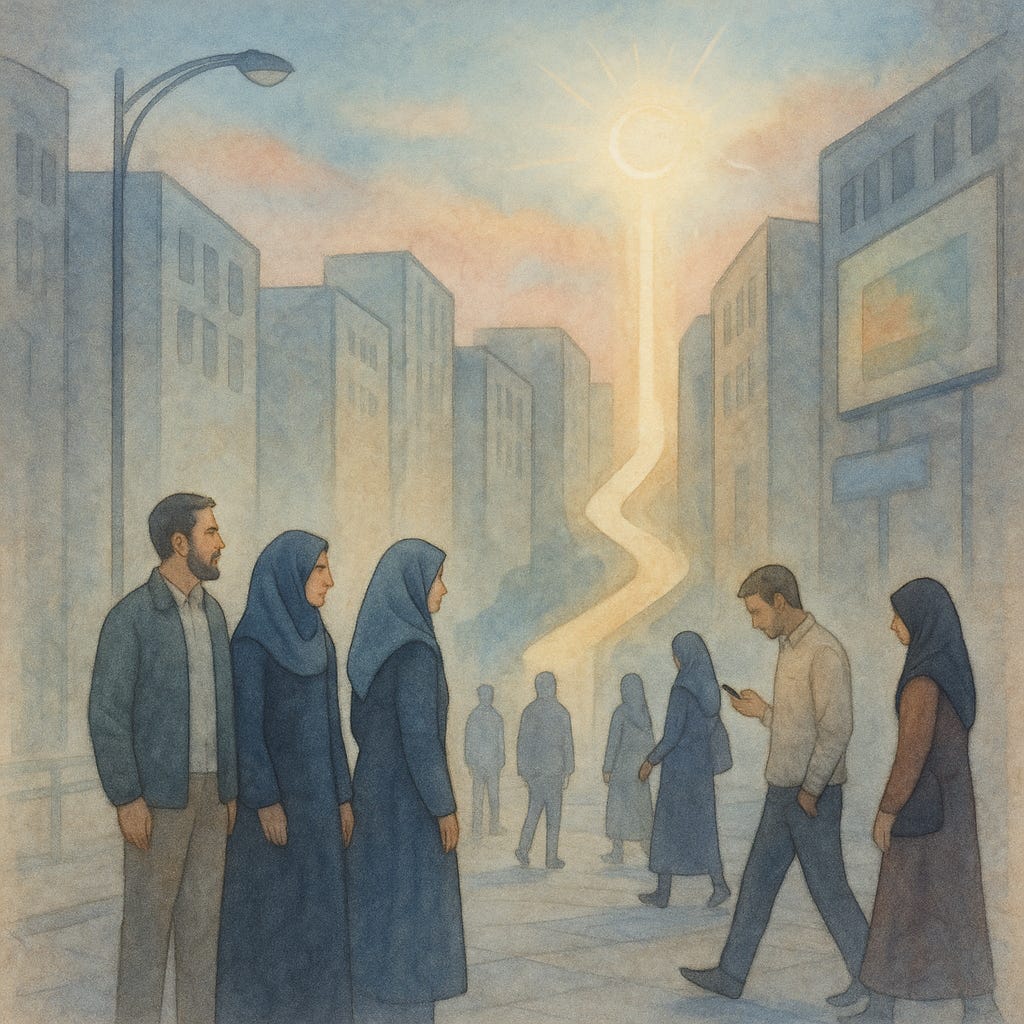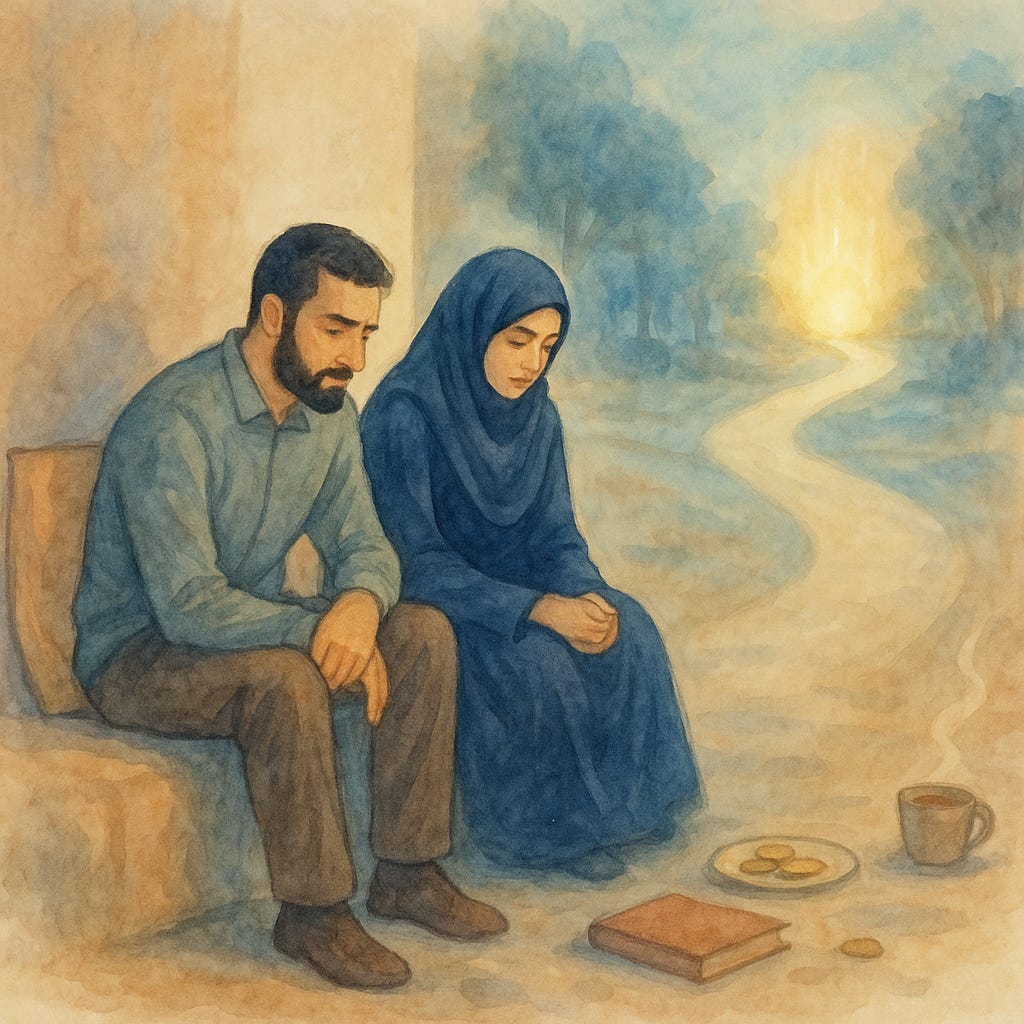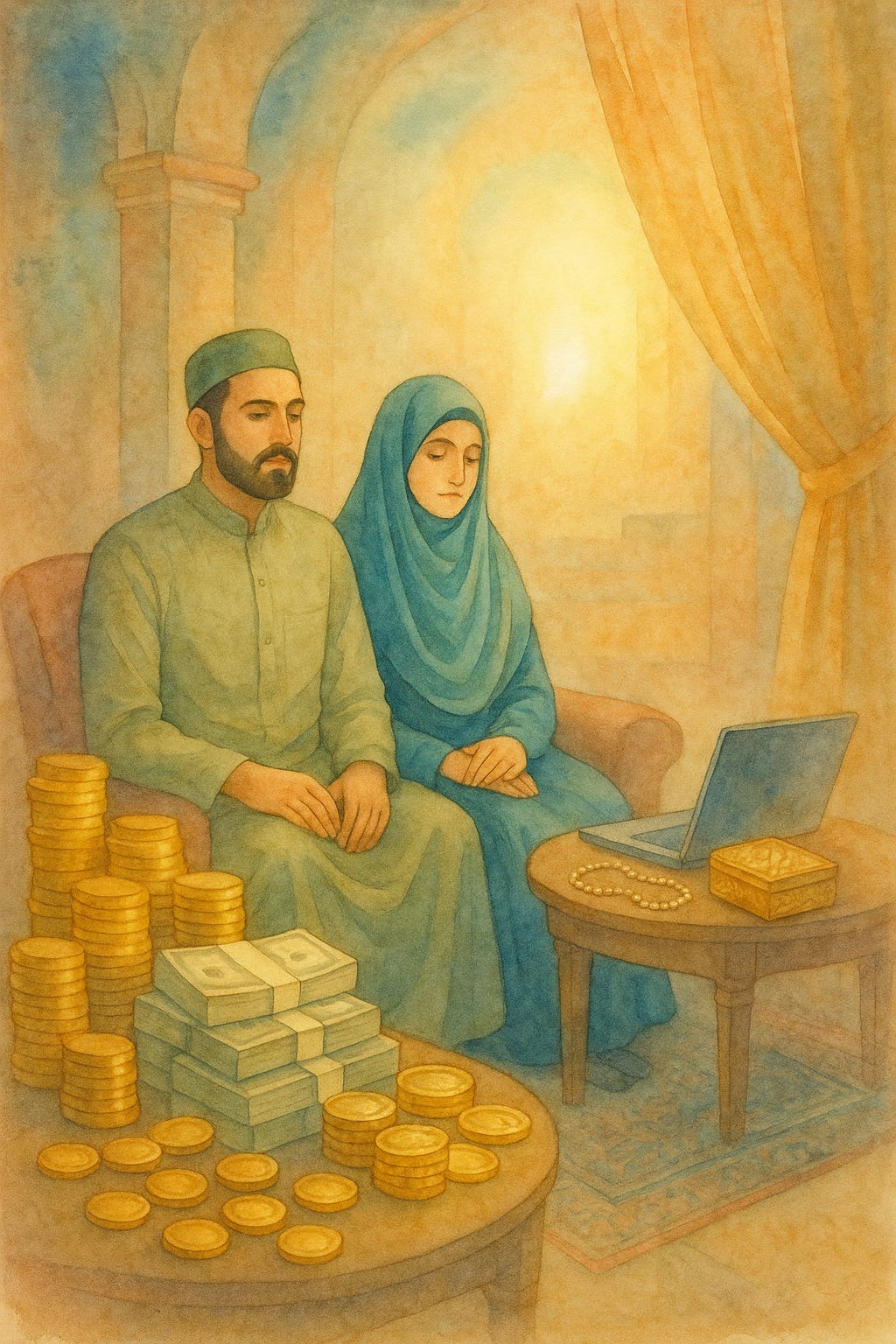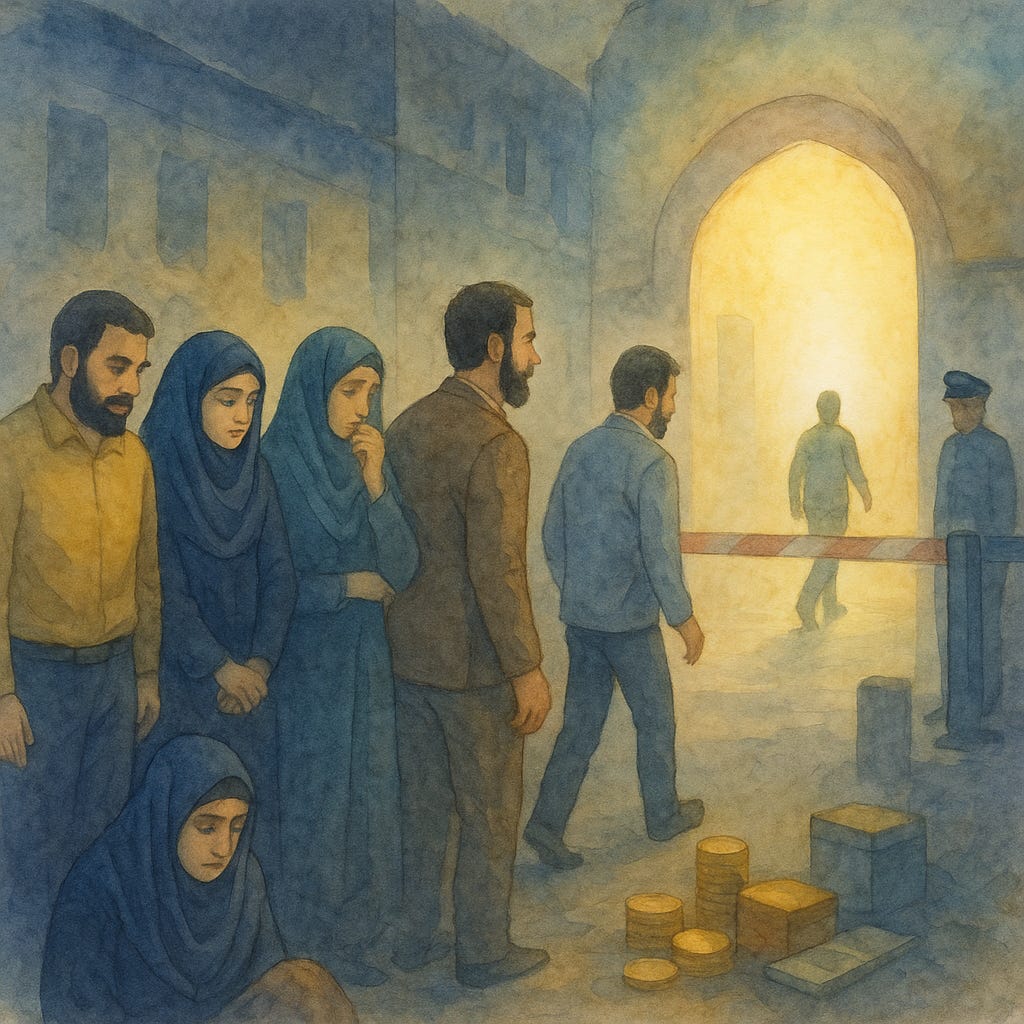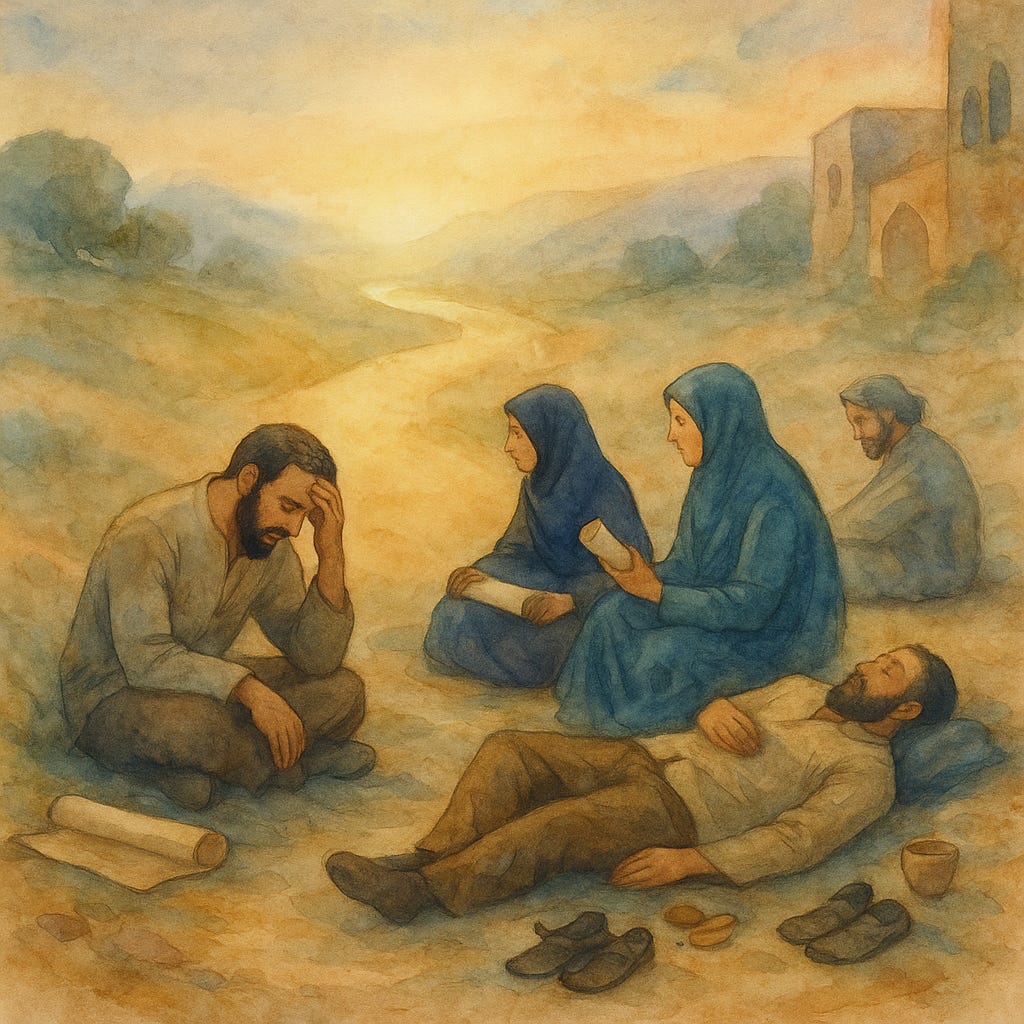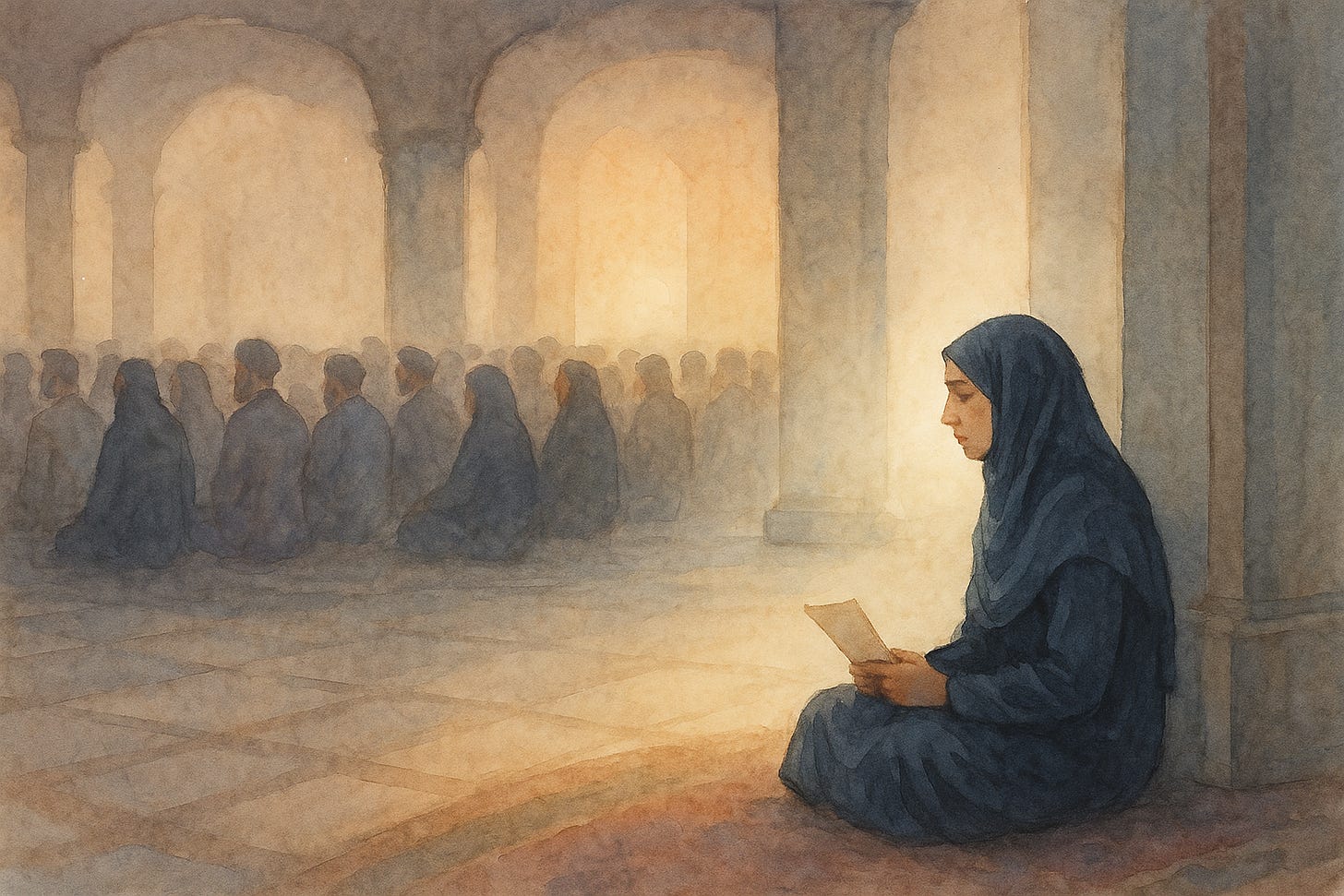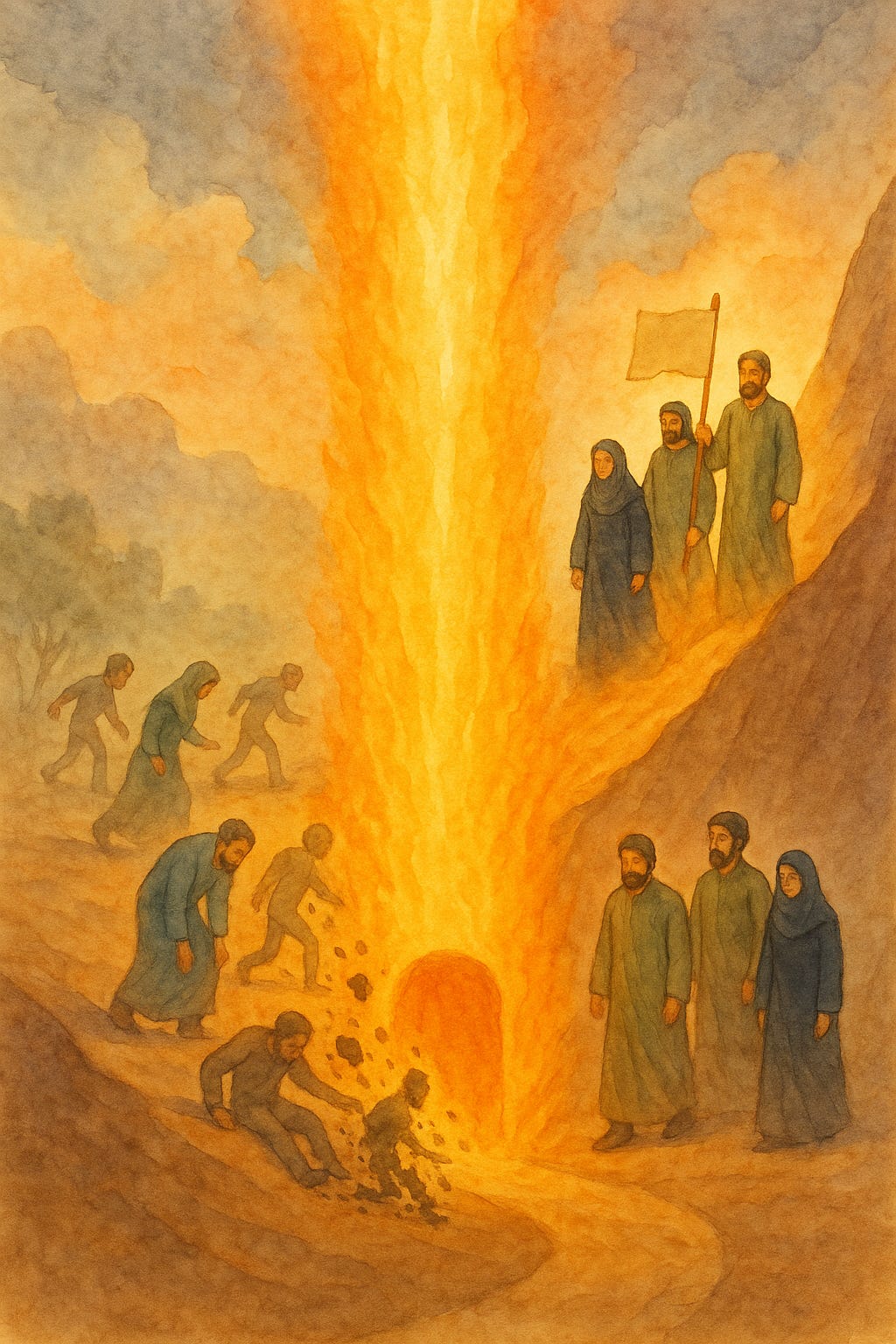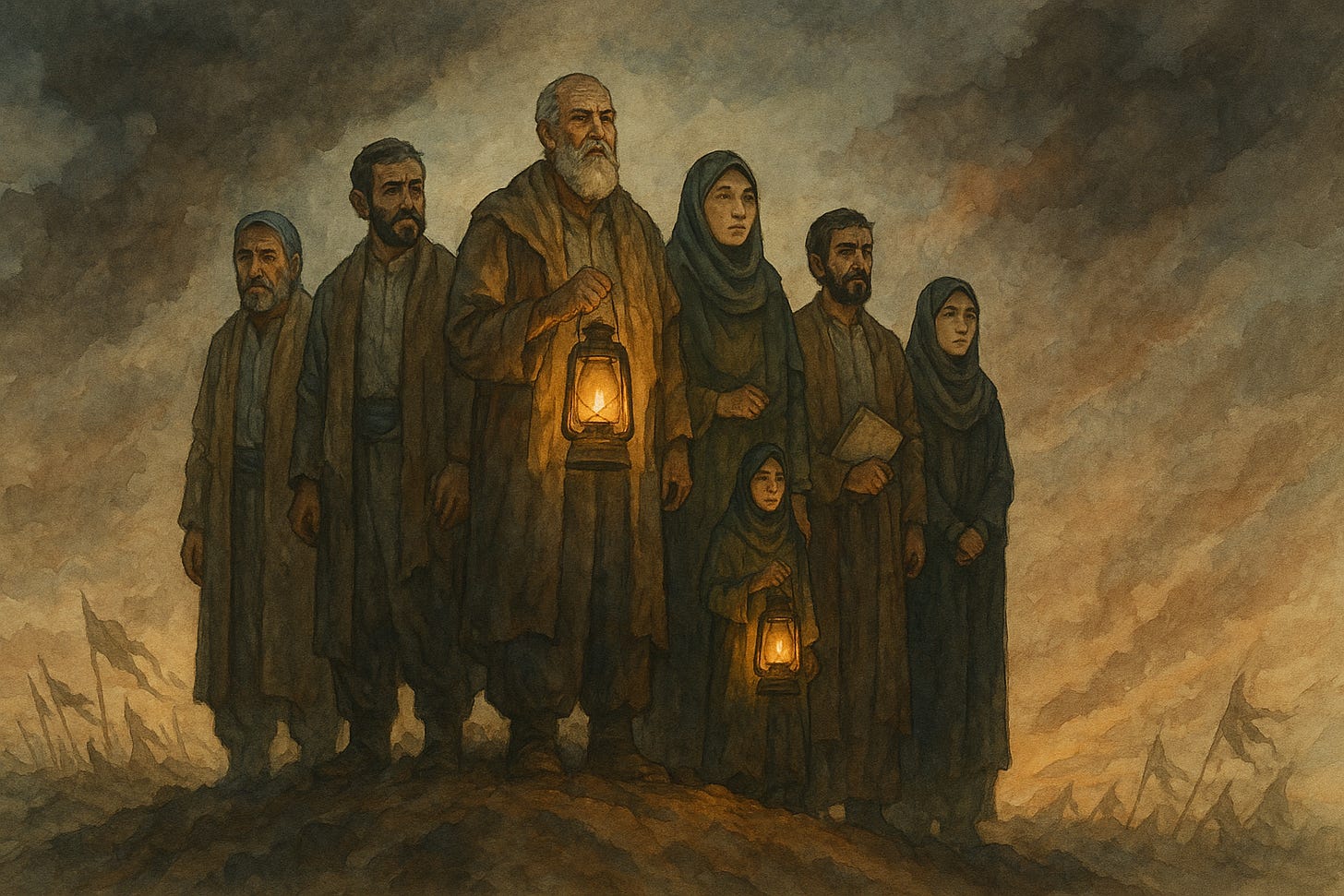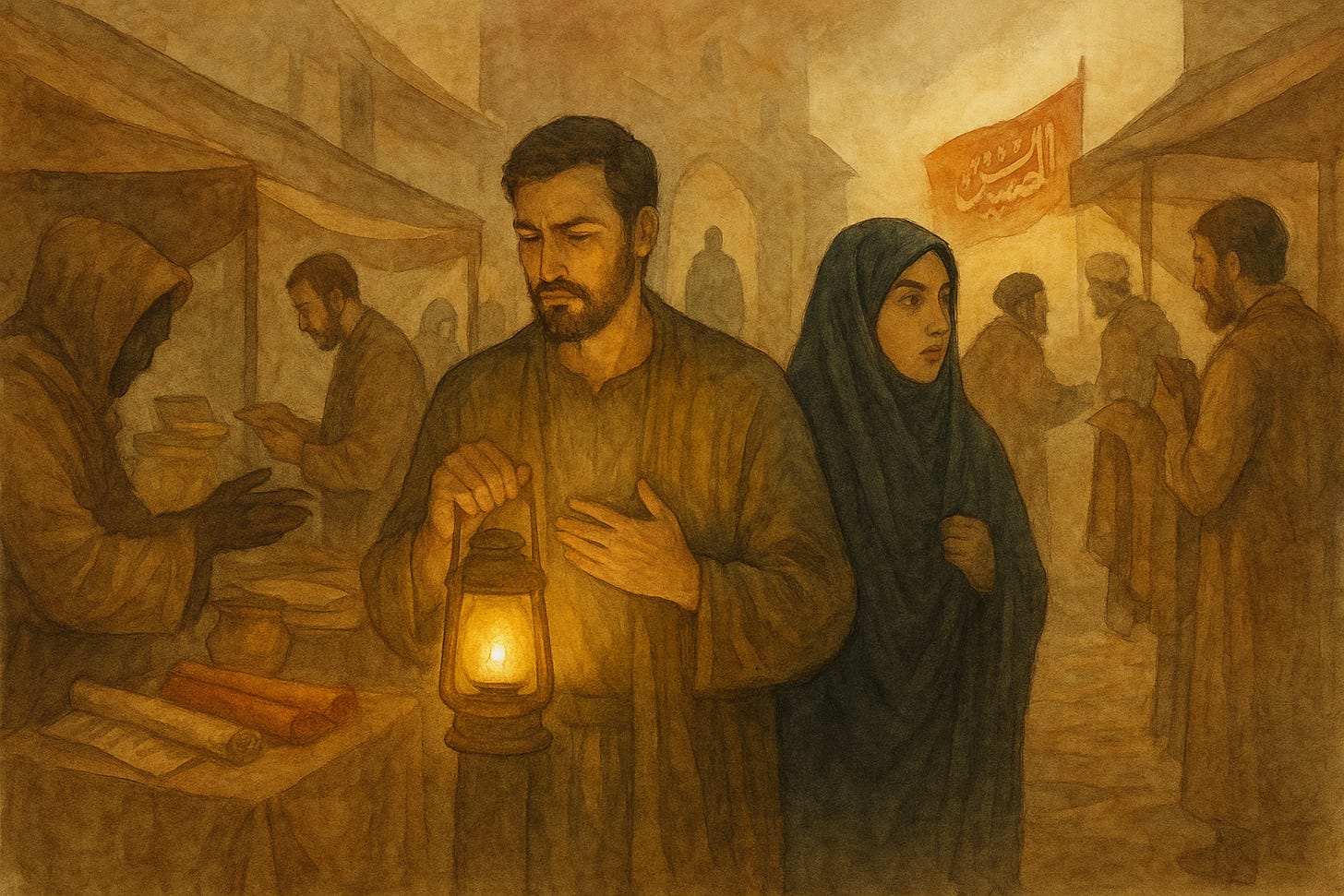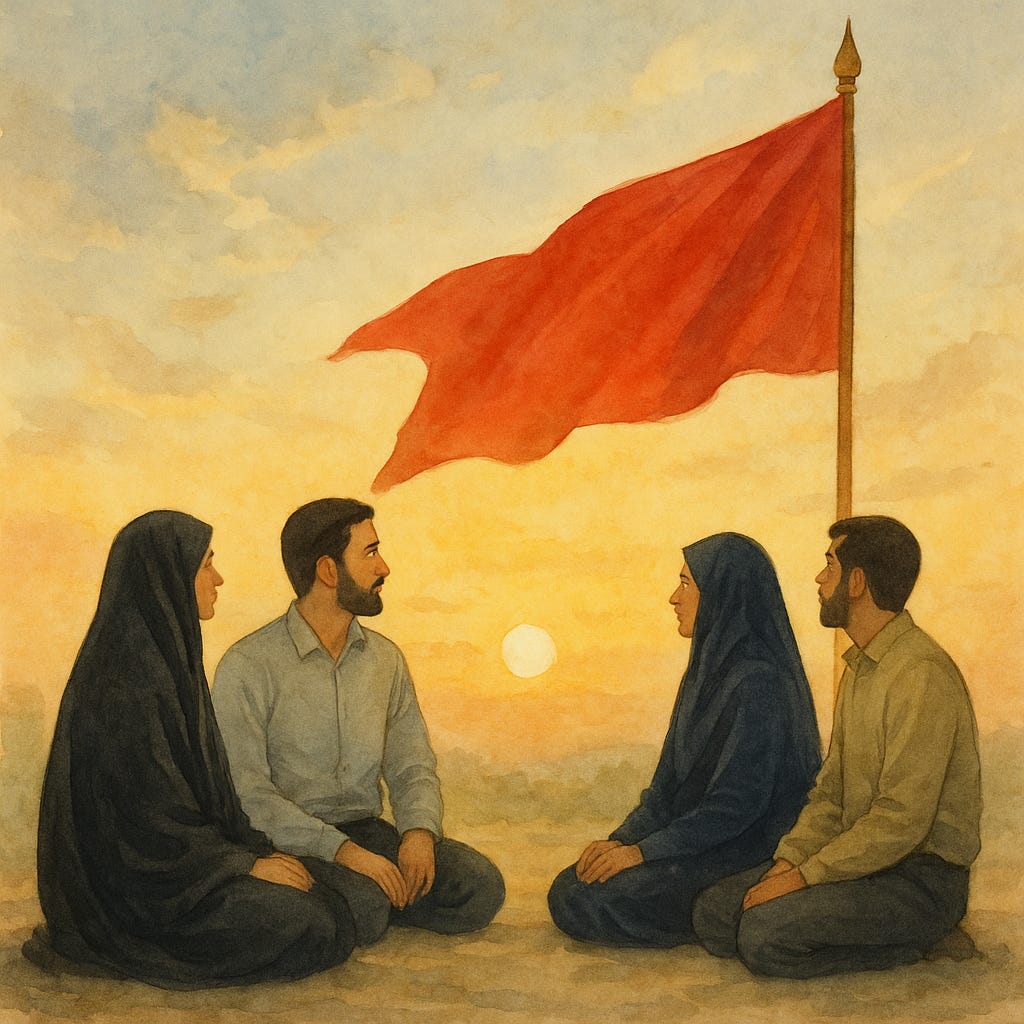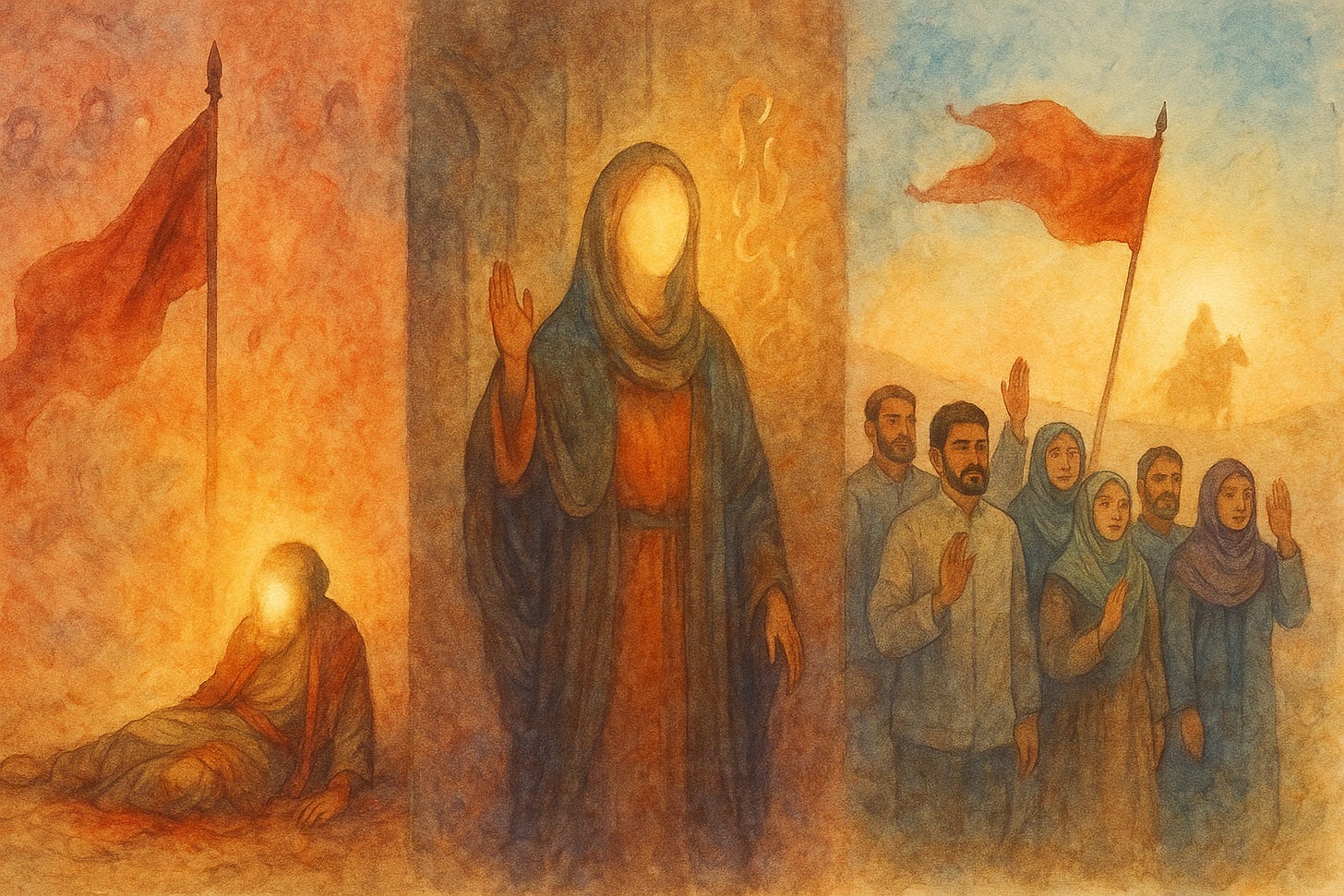[10] Tabyeen (Clarification) - Trials, Deviation, and Steadfastness
A series of discussions on the notion of clarification; critical within Islam and Islamic thought. This series is based on lectures delivered by Imam Khamenei. These sessions are for Ashura 2025/1447
In His Name, the Most High
اَلسَّلاَمُ عَلَيْكَ يَا أَبَا عَبْدِاللَّهِ
وَعَلَى الْأَرْوَاحِ الَّتِي حَلَّتْ بِفِنَائِكَ
عَلَيْكُمْ مِنَّا جَمِيعًا سَلاَمُ اللَّهِ أَبَدًا مَا بَقِينَا وَبَقِيَ اللَّيْلُ وَالنَّهَارُ
وَلا جَعَلَهُ اللَّهُ آخِرَ الْعَهْدِ مِنَّا لِزِيَارَتِكُمْ
اَلسَّلاَمُ عَلَى الْحُسَيْنِ
وَعَلَى عَلِيِّ بْنِ الْحُسَيْنِ
وَعَلَى أَوْلَادِ الْحُسَيْنِ
وَعَلَى أَصْحَابِ الْحُسَيْنِPeace be upon you, O Aba Abdillah (O Husayn),
and upon the souls who have gathered in your courtyard.
Upon you, from us all, is the peace of God—forever,
for as long as we remain and as long as night and day endure.
And may God never make this our last pledge to visit you.Peace be upon al-Husayn,
and upon Ali, son of al-Husayn,
and upon the children of al-Husayn,
and upon the companions of al-Husayn.—Adapted from Ziyarat Ashura1
Introduction
This is the tenth in our series of sessions, for the nights of Ashura and Arbaeen, on the subject of Tabyeen (or clarification).
This is the last part in the first series on Tabyeen, we will be continuing this series during the ten nights of Arbaeen, God willing.
As with our other sessions - such as those on Patience, the Lantern of the Path or on the Art of Supplication - it is strongly recommended that the reader, at the very least review the previous sessions prior to consuming this one.
This is because of the nature of the discussion, and the manner of discourse requires that each part build upon the ones that came before; so as to avoid confusion, misunderstanding and any invalid assumptions; that can lead to what would be the antithesis of tabyeen (clarification).
While we do have a recap for each session (after the first), the recap is highly summarised, and to get the full nuance, the previous sessions will need to be consumed, studied and reflected upon.
The previous sessions can be found here:
Video of the Majlis (Sermon/Lecture)
Audio of the Majlis (Sermon/Lecture)
Recap
The Response to Clarification
In the previous session, we examined the critical stage that follows tabyeen: the individual and collective response to clarified truth. We affirmed that clarification is not merely a transmission of information — it is a moral unveiling that demands a response.
Through the Quran and the teachings of the Ahl al-Bayt (peace be upon them), we explored four archetypes of response:
The submissive believer, who accepts and obeys without hesitation;
The defiant rejecter, who opposes the truth knowingly;
The hesitant and delayed, who recognise the truth but refuse to act;
The passive approver, who agrees silently but never aligns in deed.
Among these, the most insidious is the one who claims loyalty without action — who praises truth yet remains detached from its struggle. Their passivity is not neutrality, but betrayal. And as we saw in Ziyarat Nahiyah al-Muqaddasah2, even being pleased with falsehood — while doing nothing to oppose it — is enough to merit divine condemnation.
The ideal response is wilayah: conscious, committed alignment with the clarified truth and its bearers. This is not a matter of slogans or sentiment. It is loyalty in word, deed, and sacrifice. It is obedience not to abstract ideals but to the living structure of divine authority.
But even this is not the final station.
For many recognise, and even respond rightly — only to later falter. The trials that follow clarification are subtle and severe. Betrayal does not always come from ignorance — it often comes after clarity, when the path becomes long, lonely, or dangerous.
And so in this final part of the first series of sessions on Tabyeen, we turn to the next chapter in this journey:
What happens after truth is seen and sided with?
What are the tribulations that test our loyalty?
And how do we remain steadfast — unwavering — in the era of sedition?
The war on truth does not end with its exposure. It continues through distraction, fatigue, fear, and worldly temptation. The next test is not whether we know — but whether we will endure.
Tabyeen (Clarification) - Trials, Deviation, and Steadfastness
Recognition is Not the End
Even when the truth has been clarified — even when it is accepted and loyally embraced — the journey does not end. In fact, it is only then that the true tests begin.
The Quran and the legacy of the Imams (peace be upon them) are filled not only with stories of those who rejected the truth, but with those who recognised it and still fell away. Deviation is not confined to the ignorant. Betrayal is not the exclusive domain of the misguided. The most severe betrayals in history came after clarity, not before it.
وَمَا يُؤْمِنُ أَكْثَرُهُم بِاللَّهِ إِلَّا وَهُم مُّشْرِكُونَ
“And most of them do not believe in God without also associating others with Him.”
— Quran, Surah Yusuf (The Chapter of Joseph) #12, Verse #106
This verse does not speak of ignorance. It speaks of corruption after belief — of those whose initial acceptance becomes diluted, compromised, or corrupted by the influences of fear, pride, or desire.
The Imam who clarified the Quran most sharply — Imam Ali (peace be upon him) — witnessed this pattern in his own companions. In a single sentence, he revealed the cause:
كَمْ مِنْ عَقْلٍ أَسِيرٍ تَحْتَ هَوَى أَمِيرٍ
“How many an intellect is imprisoned under the command of desire.”
— Nahjul Balagha3, Hikmah (Saying) #222
Desire — not ignorance — is often what corrupts a believer after guidance. One may see the truth, affirm it, even love it — but when the desires of the self reassert their rule, the intellect becomes a prisoner, and wilayah is quietly replaced by convenience.
This is why our greatest supplications, even from the purified Imams, include pleas for firmness and continuity — not merely for initial guidance.
In Dua al-Ahd (the Supplication of the Covenant)4, we are taught to say:
اللَّهُمَّ اجْعَلْنِي مِنْ أَنْصَارِهِ، وَالذَّابِّينَ عَنْهُ، وَالْمُسَارِعِينَ إِلَيْهِ فِي قَضَاءِ حَوَائِجِهِ، وَالْمُمْتَثِلِينَ لِأَوَامِرِهِ، وَالْمُحَامِينَ عَنْهُ، وَالسَّابِقِينَ إِلَى إِرَادَتِهِ
“O God, make me among his supporters, those who defend him, who hasten to fulfil his needs, who obey his commands, who protect him, and who precede others in responding to his will…”
— Dua al-Ahd5
This is the voice of the committed — not satisfied with having seen the Imam, but begging for the grace to remain with him, in every situation, under every pressure.
And why is this plea necessary?
Because some abandon the field after embracing the truth.
Because some turn away after joining the ranks.
Because truth — though it clarifies the path — does not eliminate the weight of the journey.
In the age of sedition and ideological war, the danger is not only not knowing — it is knowing, and then drifting. And so the question becomes:
Now that we have clarified the truth, and responded to it — how do we guard ourselves from falling away?
This is the question to which we now turn.
The Causes of Deviation
So why do people deviate after recognising the truth?
The answer lies not in a sudden shift, but in a slow erosion of conviction — a quiet internal corrosion that begins long after tabyeen has done its work. Clarification pierces the heart, but the world does not let go so easily. The soul begins to make concessions. It still remembers the truth, but it begins to long for relief from the burdens that truth imposes.
The causes of this deviation are manifold — but nearly all stem from a gradual surrender to the forces of comfort, fear, fatigue, or worldly attachment.
Love of the World (hubb al-dunya)
The most frequently cited cause of spiritual downfall is not disbelief — but excessive attachment to this world. The Quran warns:
فَخَلَفَ مِن بَعْدِهِمْ خَلْفٌ أَضَاعُوا الصَّلَاةَ وَاتَّبَعُوا الشَّهَوَاتِ فَسَوْفَ يَلْقَوْنَ غَيًّا
“Then there succeeded them generations who neglected prayer and followed their desires — so they will meet with deviation.”
— Quran, Surah Maryam (the Chapter of Saint Mary) #19, Verse #59
Desire is not always evil in its appearance. It may come disguised as opportunity, stability, even moderation. But it drags the soul away from the clarity it once held. The truth becomes a burden rather than a beacon.
Fear of Loss or Persecution
Many know the truth, but are paralysed by fear. Fear of social alienation, fear of institutional backlash, fear of economic harm. They do not reject truth, but they delay, defer, or distance themselves from it — until they no longer feel its pull.
This was the case of many in the Quranic narrative. When Talut’s army was tested with the river, only a few remained:
فَشَرِبُوا مِنْهُ إِلَّا قَلِيلًا مِّنْهُمْ
“They drank from it — except for a few of them.”
— Quran, Surah al-Baqarah (the Chapter of the Cow) #2, Verse #249
The test was not one of knowledge — it was one of restraint, loyalty, and the ability to withstand discomfort.
Mental and Spiritual Fatigue
Enduring in truth is exhausting. Those who bear the burden of tabyeen, or who stand with the clarified path, often suffer burnout. The path is long, the opposition is fierce, and the results are slow to manifest. Over time, the soul begins to crave ease over struggle, and fatigue is mistaken for wisdom.
Imam Ja‘far al-Sadiq (peace be upon him) described the subtle creep of hypocrisy into a believer’s life:
مَا مِنْ عَبْدٍ إِلَّا وَفِي قَلْبِهِ نِفَاقٌ… فَإِذَا أَصْبَحَ وَأَمْسَى عَلَى مَا يُحِبُّ اللَّهُ، عَزَّ وَجَلَّ، طَهَّرَ نِفَاقَهُ
“There is no servant except that some hypocrisy resides in his heart… but if he rises and sleeps each day doing what God loves, He purifies him of it.”
— Al-Kulayni, Al-Kafi, Book of Faith and Disbelief, Chapter on Hypocrisy, Volume 2, Page 290, Hadeeth #3
Deviance begins when one stops renewing the struggle — when one permits the inertia of fatigue to override the demands of faith.
Social Pressure and Isolation
Truth often isolates. To stand with clarified truth means to stand against popular opinion, institutional inertia, and sometimes even one’s own community, or even family. The fear of being alone, misunderstood, or vilified causes many to slowly retreat — not into denial, but into irrelevance.
This is why Imam al-Sajjad (peace be upon him), in his long whispering prayer of the devout, pleads:
وَاجْعَلْنِي مِمَّنْ قَوِيَ عَلَى طَاعَتِكَ، فِي كُلِّ وَقْتٍ وَزَمَانٍ
“Make me of those who are strong in obeying You, in every time and era.”
— Sahifa as-Sajjadiyyah6, Dua #207, Dua Makarim al-Akhlaq (On Noble Moral Traits and Acts Pleasing to God)8
He does not ask merely for initial guidance — but for sustained strength in obedience, no matter what age or setting.
These are the hidden forces behind deviation after tabyeen:
They rarely announce themselves.
They do not shatter the soul overnight.
They wear it down — quietly, persistently — until it begins to prefer ease over truth, safety over sacrifice, and relevance over resistance.
And so the battle begins — not of recognition, but of resistance against erosion.
Fitnah as a Divine Test
Trials — or fitan — are not disruptions of the Divine order. They are part of it. In fact, they are essential to it. They reveal the hidden. They sift the souls. And they expose the difference between truth professed and truth lived.
The Quran speaks of fitnah not as a punishment alone, but as a test of sincerity:
أَحَسِبَ ٱلنَّاسُ أَن يُتْرَكُوٓا أَن يَقُولُوٓا آمَنَّا وَهُمْ لَا يُفْتَنُونَ
“Do people think they will be left alone because they say: ‘We believe’, and will not be tested?”
— Quran, Surah al-Ankabut (the Chapter of the Spider) #29, Verse #2
The declaration of faith is not proof of faith. It is the entry into a trial that reveals its true weight. Fitnah comes after tabyeen, not before. It does not ask: Do you recognise the truth? It asks: Will you stay with it when it costs you everything?
This is why Imam Ali (peace be upon him), in one of the most sobering descriptions of communal testing, said:
إِنَّمَا بَدْءُ وُقُوعِ الْفِتَنِ أَهْوَاءٌ تُتَّبَعُ، وَأَحْكَامٌ تُبْتَدَعُ، يُخَالَفُ فِيهَا كِتَابُ اللَّهِ، وَيَتَوَلَّى عَلَيْهَا رِجَالٌ رِجَالًا، عَلَى غَيْرِ دِينِ اللَّهِ
“The origin of fitnah is the following of desires and the innovation of rulings. In it, the Book of God is opposed, and men take charge over other men on a religion other than the religion of God.”
— Nahjul Balagha9, Sermon #50
Here, the Imam unveils the anatomy of fitnah: it begins in desire, matures in innovation, and spreads through illegitimate authority. In every generation, the same pattern unfolds — and those who once stood firm may find themselves slowly swept away.
Fitnah, therefore, is not a random storm. It is a divine sieve, separating the gold from the dross. The Quran confirms this explicitly:
مَا كَانَ ٱللَّهُ لِيَذَرَ ٱلْمُؤْمِنِينَ عَلَىٰ مَآ أَنتُمْ عَلَيْهِ حَتَّىٰ يَمِيزَ ٱلْخَبِيثَ مِنَ ٱلطَّيِّبِ
“God will not leave the believers in the state in which you are, until He distinguishes the evil from the good.”
— Quran, Surah Aal-e-Imraan (The Chapter of the Family of Imraan) #3, Verse 179
This process is necessary, not optional. Without it, the ummah would be confused by outward appearances — by pious slogans and respectable postures. Fitnah unmasks all of that. It asks: Will you follow the clarified truth when it brings hardship, not applause?
In our own time, this sifting continues. Those who once stood with truth may now seek neutrality. Those who once spoke may now fall silent. Those who once bore flags may now trade them for invitations to comfort. But the fitnah was always coming — and its purpose is clear:
To separate those who say they love the truth,
from those who are prepared to bleed for it.
As the Quran says:
وَلَنَبْلُوَنَّكُمْ حَتَّىٰ نَعْلَمَ ٱلْمُجَـٰهِدِينَ مِنكُمْ وَٱلصَّـٰبِرِينَ وَنَبْلُوَ أَخْبَارَكُمْ
“And We will surely test you until We make evident those who strive among you and those who are patient, and We will test your claims.”
— Quran, Surah Muhammad (the Chapter of (Prophet) Muhammad) #47, Verse #31
Fitnah is not about exposing enemies — it is about revealing whether we ourselves are real.
Steadfastness is Victory
If trials (fitan) are the Divine sifting of truth and falsehood, then steadfastness (sabr) is the measure of success. It is not the brilliance of one’s arguments, nor the intensity of one’s recognition, but the ability to remain, to endure, and to continue that distinguishes the loyal from the fleeting.
Steadfastness is the companion of truth in every age. The Quran never promises ease to the believer — it promises:
يَا أَيُّهَا الَّذِينَ آمَنُوا اسْتَعِينُوا بِالصَّبْرِ وَالصَّلَاةِ ۚ إِنَّ اللَّهَ مَعَ الصَّابِرِينَ
“O you who believe, seek help through patience and prayer. Surely, God is with those who are patient.”
— Quran, Surah al-Baqarah (the Chapter of the Cow) #2, Verse #153
It is through patience — not popularity, not numbers, not immediate outcomes — that divine companionship is gained.
Imam Ali (peace be upon him), whose life was a symphony of endurance, said:
الصَّبْرُ مِنَ الإِيمَانِ كَالرَّأْسِ مِنَ الْجَسَدِ، فَإِذَا قُطِعَ الرَّأْسُ بَارَ الجَسَدُ
“Patience to faith is like the head to the body — if the head is cut off, the body perishes.”
— Nahjul Balagha10, Hikmah (Saying) #82
This is not mere metaphor. The truth, once clarified, will inevitably invite hardship — and without sabr, the soul will bleed itself dry trying to escape the cost of its own recognition.
That is why the dua’s of the Ahl al-Bayt (peace be upon them) are filled not only with pleas for guidance, but pleas for constancy. In Ziyarat Warith11, we call upon God to include us among those who remained with Imam Husayn (peace be upon him):
وَثَبِّتْ قَدَمِي عَلَى صِرَاطِكَ الْمُسْتَقِيمِ
“And make firm my feet upon Your straight path…”
— Ziyarat Warith12
Likewise, in Ziyarat Amin Allah13, Imam al-Sadiq (peace be upon him) teaches us:
وَثَبِّتْنِي عَلَى مَوَالَاةِ أَوْلِيَائِكَ، وَمُعَادَاةِ أَعْدَائِكَ، وَالإِقْتِدَاءِ بِسُنَّةِ خَاتَمِ أَنْبِيَائِكَ
“Make me firm upon the loyalty to Your friends, enmity toward Your enemies, and adherence to the Sunnah of the Seal of Your Prophets.”
— Ziyarat Amin Allah14
These are not pious flourishes. They are survival strategies. In a time when the clarified truth is under siege, and fatigue whispers louder than conviction, the highest act of resistance is to remain.
And history offers us examples.
Ammar ibn Yasir — bruised and aged, yet unshakable.
Sayyedah Zaynab — veiled in chains but towering over empires.
Hurr ibn Yazid ar-Riyahi — one who faltered, then rose with decisive steadfastness, never turning back.
Their greatness was not in their mere recognition of truth. It was in their willingness to stay with it — until the end.
Those who endure are not spectators of tabyeen. They are its proof.
They carry its light.
And when the world forgets or flees, they are the ones who say:
“We were with you, and we remain.”
These are the true partisans of truth — not only because they saw it, but because they remained loyal to it when others fled.
The Final Plea — Do Not Sell the Truth
There comes a time in the journey of every believer — after the truth has been clarified, after the ranks have been chosen, after the trials have begun — when the soul is offered a bargain.
It is rarely framed as treachery. It may come in the name of pragmatism, maturity, even wisdom. It offers relief. It offers safety. It says: You’ve done enough. Let others carry it now. It invites you to sell the truth — not outright, but slowly, and with subtle terms.
The Quran describes this spiritual transaction in terms that should shake the heart:
أُو۟لَـٰٓئِكَ ٱلَّذِينَ ٱشْتَرَوُا ٱلضَّلَـٰلَةَ بِٱلْهُدَىٰ فَمَا رَبِحَت تِّجَـٰرَتُهُمْ وَمَا كَانُوا۟ مُهْتَدِينَ
“They are the ones who have purchased misguidance in exchange for guidance. But their trade has brought no profit, and they are not rightly guided.”
— Quran, Surah al-Baqarah (the Chapter of the Cow) #2, Verse #16
This is not a metaphor — it is a reality.
Guidance is not lost in one step. It is sold — for social acceptance, for fear of controversy, for worldly gain, or for comfort in old age. And it is always sold after it has been recognised. It is never ignorance that causes this. It is choice.
The tragedy is that the soul believes this trade is temporary — that one can return to truth later. But by then, the heart has hardened. The zeal has faded. The conscience has been silenced.
Ziyarat Ashura15 teaches us to recognise this danger and to plead with God for the courage to never accept the offer:
اللَّهُمَّ اجْعَلْ مَحْيَايَ مَحْيَا مُحَمَّدٍ وَآلِ مُحَمَّدٍ، وَمَمَاتِي مَمَاتَ مُحَمَّدٍ وَآلِ مُحَمَّدٍ
“O God, make my life the life of Muhammad and the family of Muhammad, and my death the death of Muhammad and the family of Muhammad.”
— Ziyarat Ashura16
This is not merely about love. It is about loyalty — a prayer to never depart from their path, no matter the cost. To live and die as they lived and died: clarifying truth, enduring trial, and refusing to sell the sacred for the cheap.
And so we end this part of the series with a plea — a plea that we direct first to our own hearts, and then to our communities:
Let us not be among those who claim to love truth,
but walk away when it becomes heavy.
Let us not applaud the martyrs, but flee from their footsteps.
Let us not recite the names of the Ahl al-Bayt, but abandon their stances.
Let us not be among those who trade the truth for a moment of ease.
For in this era — as in every era — truth needs not only those who recognise it, but those who remain with it, until the very end.
Conclusion
The Steadfast Remnant
With this tenth session, we conclude the first arc of our journey through the path of tabyeen — the sacred responsibility to clarify, unveil, and defend truth in an age of confusion, distortion, and ideological war.
We have traversed ten sessions exploring not just the meaning of tabyeen, but its urgency, its targets, its methods, and the spiritual responses it evokes. We have seen that recognising the truth is not the highest station — remaining loyal to it, defending it, and enduring its consequences is the true measure of faith.
But now a new question confronts us:
Who carries the duty of tabyeen?
Whose shoulders must bear the burden of truth in every age and society?
In the next phase of this series — which will resume in Arbaeen of 2025 — we will turn our attention to the specific responsibilities of the various agents of influence within the ummah.
We will examine:
The trust placed upon prayer leaders, khateebs, and pulpit preachers
The moral and intellectual duty of scholars, teachers, and seminary students
The spiritual and strategic role of youth in shaping the future
The leadership of elite women, following in the footsteps of Lady Zaynab (peace be upon her)
The impact of poets, eulogists, artists, and cultural creators
And the weight of accountability upon activists, writers, and those who speak in public
For tabyeen is not the task of one class — it is the covenant of the aware, the awake, and the entrusted.
And so, we close this chapter with a prayer:
That we may never abandon what we have recognised.
That we may never soften the truth in search of safety.
And that we may rise — in our own domain — to become among those who clarify, who guide, and who stand firm when others fall silent.
فَاسْتَقِمْ كَمَا أُمِرْتَ وَمَن تَابَ مَعَكَ
“So remain firm, as you have been commanded — and those who turn to God with you.”
— Quran, Surah Hud (the Chapter of (Prophet) Hud) #11, Verse #112
This is not the end.
It is a pause — before we rise again.
In Arbaeen 2025, we will resume.
And we will speak — of those who must speak.
Supplication-Eulogy: #10: “The Blood and the Banner”
Tenth Night - “The Blood and the Banner”
In His Name, the Lord of the Martyrs and the Truthful
O God, Send your blessings upon Muhammad and the Family of Muhammad
O God…
This is the day the earth stood still.
This is the day swords were sharpened
against the throat of Your light.This is the day Husayn stood alone.
His companions gone.
His family slaughtered.
His body wounded.
His lips dry.And still — he prayed.
Peace be upon the one whose jugular was severed
O my Lord…
Who else, after him, carried such sorrow with such certainty?
He watched the camp burn.
He saw Zaynab stand amid smoke and terror.
He heard the cries of children.
And still — he walked to the battlefield
not as a man seeking death,
but as a guide fulfilling his covenant.He was the last to fall.
No one to cradle his head.
No one to catch his final breath.They struck him from all sides.
They severed his sacred head.
They raised it upon a lance.
And the angels wept.O God…
How did the sun rise again after that day?
How did the earth not collapse
beneath the weight of its betrayal?But You did not leave his blood without a voice.
You raised Zaynab.
She stood, not with sword,
but with truth.
In the palace of Yazid,
she proclaimed Karbala.
Her words crushed thrones.
Her patience shamed tyrants.“I saw nothing but beauty,” she said.
For every sword they drew, she raised a word.
For every scream they caused, she gave silence that thundered.O Master of our age…
You are the continuation of this blood.
You are the awaited one.
You are the avenger of Husayn.How long must we wait
while his head lies on no body,
while his killers are praised by the blind?Where are you, O son of Zaynab?
Where is your cry: “O avengers of Husayn”?Let this mourning transform us.
Let our tears become action.
Let this grief become movement.
Let us rise,
not just to cry —
but to carry his message
and her mission.O God, make me among those who seek the vengeance of Husayn
under the leadership of the supported Imam.And grant me the cry of Zaynab, her silence,
and her strength that shattered swords.Tonight is not the end —
It is the beginning.
The beginning of remembrance.
The beginning of resistance.
The beginning of return.Tonight we say: O Husayn, we are with you.
O Zaynab, your message lives in our throats.
We will not forget. We will not be silent.
We await your son, and we walk your path.
And from Him alone is all ability and He has authority over all things.
Adapted from Ziyarat Ashura. The original from Ziyarat Ashura is in the singular form, I have taken the liberty of pluralising it:
The original Arabic and English translation is as follows:
اَلسَّلاَمُ عَلَيْكَ يَا أَبَا عَبْدِاللَّهِ
وَعَلَى الْأَرْوَاحِ الَّتِي حَلَّتْ بِفِنَائِكَ
عَلَيْكُمْ مِنِّي جَمِيعًا سَلاَمُ اللَّهِ أَبَدًا مَا بَقِيتُ وَبَقِيَ اللَّيْلُ وَالنَّهَارُ
وَلا جَعَلَهُ اللَّهُ آخِرَ الْعَهْدِ مِنِّي لِزِيَارَتِكُمْ
اَلسَّلاَمُ عَلَى الْحُسَيْنِ
وَعَلَى عَلِيِّ بْنِ الْحُسَيْنِ
وَعَلَى أَوْلَادِ الْحُسَيْنِ
وَعَلَى أَصْحَابِ الْحُسَيْنِPeace be upon you, O Aba Abdillah (O Husayn),
and upon the souls who have gathered in your courtyard.
Upon you, from me, is the peace of God—forever,
for as long as I remain and as long as night and day endure.
And may God never make this my last pledge to visit you.Peace be upon al-Husayn,
and upon Ali, son of al-Husayn,
and upon the children of al-Husayn,
and upon the companions of al-Husayn.
I have made the following changes to the Arabic so as to pluralise:
مِنِّي (minnī - from me) changed to مِنَّا (minnā - from us)
بَقِيتُ (baqītu - I remain) changed to بَقِينَا (baqīnā - we remain)
الْعَهْدِ مِنِّي (al-'ahdi minnī - my pledge) changed to الْعَهْدِ مِنَّا (al-'ahdi minnā - our pledge)
Ziyarat Nahiyah al-Muqaddasah (الزيارة الناحية المقدسة) is a profound and deeply moving visitation text revealed by Imam al-Mahdi and narrated through reliable chains in Kamil al-Ziyarat. It is a sacred address to Imam Husayn on Ashura, expressing both profound love for the Master of Martyrs and divine wrath against his oppressors. Unlike Ziyarat Ashura, it includes detailed curses not only on the direct killers but also on those who approved of Karbala through silence or complicity—captured in powerful lines like 'اللَّهُمَّ الْعَنْ أُمَّةً سَمِعَتْ بِذٰلِكَ فَرَضِيَتْ بِهِ' (O God, exclude from your mercy a people who heard of this crime and were pleased with it). Reciting this ziyarat—especially on Ashura or at Imam Husayn’s shrine—renews our covenant of loyalty and dissociation from tyranny, while connecting us to the Hidden Imam’s own lament for his grandfather. It is a timeless weapon of the Shia, preserving the raw truth of Karbala across generations.
Nahjul Balagha (Arabic: نهج البلاغة, "The Peak of Eloquence") is a renowned collection of sermons, letters, and sayings attributed to Imam Ali, the cousin and son-in-law of the Prophet Muhammad and the first Imam of the Muslims.
The work is celebrated for its literary excellence, depth of thought, and spiritual, ethical, and political insights. Nahjul Balagha was compiled by Sharif al-Radi (al-Sharif al-Radi, full name: Abu al-Hasan Muhammad ibn al-Husayn al-Musawi al-Sharif al-Radi), a distinguished Shia scholar, theologian, and poet who lived from 359–406 AH (970–1015 CE).
Sharif al-Radi selected and organised these texts from various sources, aiming to showcase the eloquence and wisdom of Imam Ali. The book has had a profound influence on Arabic literature, Islamic philosophy, and Shia thought, and remains a central text for both religious and literary study
Dua al-Ahd, a cornerstone of Shia Islamic practice, is a daily supplication recited after Fajr (dawn prayer) to renew one's pledge of allegiance to Imam al-Mahdi, the awaited saviour in Shia theology. The term "Ahd" signifies a covenant or pledge, and this dua encapsulates the believer's commitment to support the Imam in his divinely ordained mission to establish justice and eradicate oppression from the world. Reciting Dua al-Ahd is believed to strengthen the spiritual bond between the individual and the Imam, fostering a sense of anticipation for his reappearance and inspiring believers to embody the virtues of piety, righteousness, and unwavering dedication to his cause. It serves as a constant reminder of the believer's responsibility to actively work towards moral and social reform, preparing themselves to be worthy soldiers in the Imam's army when he emerges to usher in an era of peace and justice. The dua includes powerful affirmations of loyalty, sacrifice, and obedience to the Imam's commands, reflecting a deep yearning for his presence and a fervent desire to be among his devoted followers.
See Note 4.
Sahifa al-Sajjadiyyah, also known as Zabur Al Muhammad ("The Psalms of Islam"), is a collection of prayers and supplications attributed to Imam Ali ibn al-Husayn Zayn al-Abedeen (38 AH – 94/95 AH / c. 658 CE – c. 713/714 CE), the great-grandson of the Prophet Muhammad and the fourth Imam of the Muslims.
It is highly revered in Shia Islam for its eloquent language, profound spiritual insights, and comprehensive themes encompassing a wide range of human experiences and theological concepts.
The Sahifa is considered one of the most authentic and reliable sources within Shia Islam, and is generally regarded as even more authentic than Nahjul Balagha.
This is because Sahifa al-Sajjadiyyah has well-established, multiple, and reliable chains of narration (isnaad), with two distinct and meticulously documented lines of transmission:
One through Imam Muhammad al-Baqir, the fifth Imam of the Muslims, and the other through Imam Zayd ibn Ali.
These independent chains provide strong corroborative evidence for the text's authenticity, demonstrating that it was widely disseminated and accepted within the early Shia community.
In contrast, Nahjul Balagha, though highly esteemed for its eloquence and content, was compiled by Sharif al-Radi in the 4th/10th century and often lacks complete chains of transmission for its sermons, letters, and sayings, making its authentication more challenging from a hadeeth sciences perspective.
The prayers in Sahifa al-Sajjadiyyah cover diverse topics, including praise of God, supplication for forgiveness, blessings upon the Prophet Muhammad and his family, seeking guidance, expressing gratitude, and reflecting on moral and ethical principles.
The book provides guidance on how to communicate with God, seek His mercy, and live a virtuous life. It is widely studied, recited, and used as a source of inspiration and spiritual guidance by Shia Muslims around the world.
Dua Makarim al-Akhlaq, the "Supplication for Noble Character," is the 20th supplication in Sahifa al-Sajjadiyyah, a collection of prayers attributed to Imam Ali ibn al-Husayn Zayn al-Abedeen. This profound dua is highly revered within Shia Islam for its comprehensive exploration of moral and spiritual virtues, offering guidance on cultivating righteous conduct and seeking closeness to God. It encompasses a wide range of themes, including seeking divine assistance in fulfilling religious obligations, developing virtuous traits such as humility, generosity, and forgiveness, and beseeching God to protect against moral failings like arrogance, greed, and envy. The supplication serves as a powerful tool for self-reflection and spiritual growth, inspiring believers to strive for moral excellence and to embody the highest ethical standards in all aspects of their lives, making it a central text for personal and communal development within the Shia tradition.
See Note 7.
See Note 3.
See Note 3.
Ziyarat Warith is one of the most profound and spiritually significant visitation prayers for Imam Husayn, recited by Shia Muslims worldwide—especially on Ashura, Arbaeen, and other occasions. It affirms Imam Husayn’s status as the true warith (heir) of the Prophets and a beacon of divine justice, while also expressing loyalty (tawalla) to his cause and disavowal (tabarra) of his oppressors. The ziyarat includes powerful appeals for steadfastness, such as "وَثَبِّتْ قَدَمِي عَلَى صِرَاطِكَ الْمُسْتَقِيمِ" ("Make firm my feet upon Your straight path"), linking the visitor’s spiritual journey to the Imam’s sacrifice. Narrated in classical sources like Kamil al-Ziyarat and found in Mafatih al-Jinan, Ziyarat Warith embodies the eternal bond between the believers and the Master of Martyrs, serving as both a lament and a pledge to uphold his mission until the reappearance of Imam al-Mahdi.
See Note 11.
Ziyarat Amin Allah is a profound visitation prayer deeply cherished by the Shia tradition, often recited after Ziyarat Ashura. This sacred text, narrated from Imam Ja'far al-Sadiq, encapsulates the essence of wilayah (allegiance to God’s chosen ones) and tabarra (disassociation from tyranny). Its powerful appeals—like "وَثَبِّتْنِي عَلَى مَوَالَاةِ أَوْلِيَائِكَ" ("Make me firm in loyalty to Your allies")—merge the legacy of Karbala with the eternal struggle for divine justice. Recognised in classical sources like Kamil al-Ziyarat and preserved in Balad al-Amin, this ziyarat serves as both a spiritual weapon against oppression and a covenant with the Ahl al-Bayt. By linking the believer's heart to Imam Husayn's sacrifice and the Prophet's Sunnah, it forges an unbreakable bond with the Imam of our time, renewing our pledge to uphold truth until the Day of Judgment.
See Note 13.
Ziyarat Ashura is the most powerful and spiritually transformative visitation prayer for Imam Husayn, recited by Shia Muslims worldwide—especially during Muharram and Arbaeen. This sacred text, narrated from Imam al-Baqir and preserved in Kamil al-Ziyarat, embodies the eternal covenant of loyalty (wilayah) to the Master of Martyrs while vehemently disassociating (tabarra) from his oppressors. Its profound appeals—like "اللَّهُمَّ اجْعَلْ مَحْيَايَ مَحْيَا مُحَمَّدٍ وَآلِ مُحَمَّدٍ" ("Make my life like Muhammad’s family’s life")—merge our destiny with the Ahl al-Bayt’s purified path. Beyond mourning, Ziyarat Ashura is a spiritual weapon, offering divine rewards and protection, as emphasised in hadeeths where Imam al-Sadiq called it "the most effective means for answered prayers." By reciting it with sincerity, believers spiritually join Imam al-Mahdi’s army, pledging to uphold Imam Husayn’s revolution until the Day of Judgment.
See Note 15.


